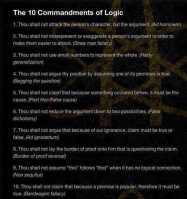Enjoy being online again!
Welcome to the community of good people who base their values on evidence and appreciate civil discourse - the social network you will enjoy.Create your free account
21 comments
Feel free to reply to any comment by clicking the "Reply" button.Had to download this. And I liked @powder 's comment
There are dozens of logical fallacies; why stop at ten?
Here is a more extensive reference (there are many):
[thelogicofscience.com]logic-part-3-logical-fallacies/
This is a great site that lists hundreds of logical fallacies. Easily searchable. [logicallyfallacious.com]
This could fit in well in "Philosophy" group. Feel free to join!?
Edit: I'm actually gonna steal this and post it there because it'll help with managing some of the debates we have.
It is important to understand that as a Westerner, your thought processes are vastly different from those who have been raised to reason dialectically, as Orientals (and the Jewish writers) were:
"...Dialectical reasoning is actually opposed to formal logic in many ways.
Western Logic Versus Eastern Dialecticism
Aristotle placed at the foundations of logical thought the following three propositions.
- Identity: A = A. Whatever is, is. A is itself and not some other thing.
- Noncontradiction: A and not A can't both be the case. Nothing can both be and not be. A proposition and its opposite can't both be true.
- Excluded middle: Everything must either be or not be. A or not A can be true but not something in between.
Modern Westerners accept these propositions (but Easterners do not)...
...three principles underlie Eastern dialecticism. Notice I didn't say "propositions..." the term "proposition" has much too formal a ring for what is a generalized stance toward the world rather than a set of ironclad rules.
- Principle of change:
Reality is a process of change.
What is currently true will shortly be false. - Principle of contradiction:
Contradiction is the dynamic underlying change.
Because change is constant, contradiction is constant. - Principle of relationships (or holism):
The whole is more than the sum of its parts.
Parts are meaningful only in relation to the whole...
These principles are intimately linked...
The principles also imply another important tenet of Eastern thought, which is the insistence on finding the "middle way" between extreme propositions...
...and Talmudic scholars developed it over the next two millennia and more.
"Mindware" Richard E. Nisbett, pp. 224-5
Wow you might want to consider joining "Philosophy" group! You seem to have an understanding of philosophy pretty well?
@EliRodriguez11 ha ty, but really i just recently read the book, and saw a connection here
I guess I am pre moses kind of old soul. I live without commandments.
I think my daughter is smarter than Moses.
That's a useful list. I've taken a screenshot of it.
It makes things much easier when arguing with someone about a topic to define it as either being a logic based argument or a moral based argument. Once we can spot which it is, we can decide whether to waste time and energy on it or not.
If the argument is morality based then most of these rules won't apply because logic cannot be applied to selfishness, bigotry, prejudice or ideology.
Oh you're just showing off that you can take a screenshot
@Flettie k
It was a thank you because that list is useful. Screenshots are not difficult.
In the age of tRump you can often throw out no. 1.
These are not the rules of logic, they are a list of common logical fallacies
The laws/rules/principles of logic are
(1) the law of contradiction,
(2) the law of excluded middle (or third)
(3) the principle of identity.
question these on the list
I have Faith in up or down or sideways or in myself.
Argument by Emotive Language. --Arguments is inefficient as an angry discussion. Emotional and intellectual (IQ) gives you a higher energy with an EQ.
Argument from Ignorance,
-Again arguments are inefficient and Ignorance applies to humans with the 1℅ collective knowledge about the earths 99℅ unknown mass.
Magic can relate to phenomena is any thing which manifests itself. Phenomena are often, but not always, understood as "things that appear" or "experiences" for a sentient being, or in principle may be so. Or consider extreme logic.
Enjoy being online again!
Welcome to the community of good people who base their values on evidence and appreciate civil discourse - the social network you will enjoy.Create your free account
Share this post
Categories
Agnostic does not evaluate or guarantee the accuracy of any content. Read full disclaimer.









